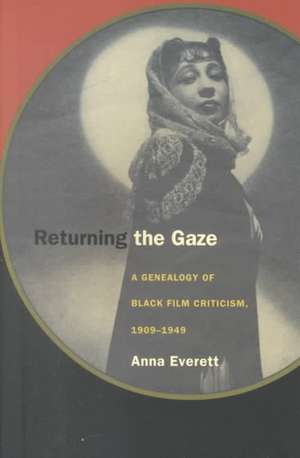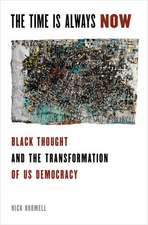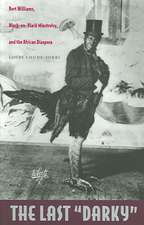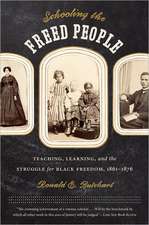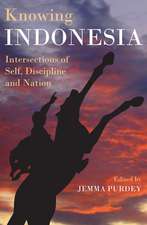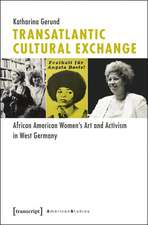Returning the Gaze – A Genealogy of Black Film Criticism, 1909–1949
Autor Anna Everetten Limba Engleză Paperback – apr 2001
Preț: 306.77 lei
Nou
Puncte Express: 460
Preț estimativ în valută:
58.70€ • 61.45$ • 48.57£
58.70€ • 61.45$ • 48.57£
Carte tipărită la comandă
Livrare economică 07-21 aprilie
Preluare comenzi: 021 569.72.76
Specificații
ISBN-13: 9780822326144
ISBN-10: 0822326140
Pagini: 376
Ilustrații: 19 b&w photographs
Dimensiuni: 159 x 236 x 30 mm
Greutate: 0.63 kg
Editura: MD – Duke University Press
ISBN-10: 0822326140
Pagini: 376
Ilustrații: 19 b&w photographs
Dimensiuni: 159 x 236 x 30 mm
Greutate: 0.63 kg
Editura: MD – Duke University Press
Recenzii
"Compelling and of great critical importance, Returning the Gaze makes a major contribution to film studies."- Dana Polan, University of Southern California "Anna Everett moves African American film criticism and commentary from the margins to the center in this innovative, imaginative, and original book. Superbly researched and engagingly written, Returning the Gaze reveals the rich, vital, but virtually unknown history of Black film criticism and commentary during the first half of the twentieth century. Positioned as the nation's radical 'other' on and off screen by both filmic conventions and dominant social institutions, African American intellectuals found themselves compelled to 'return the gaze,' to speak back to the new medium by articulating sophisticated forms offilm commentary and cultural critique. Everett's intelligent, imaginative, and original research shows us the necessity of placing race at the center of the history of the American cinema, while at the same time making it clear that any adequate understanding of African American identity needs to acknowledge the centrality of cinema to the practices and processes of U.S. racial formation."- George Lipsitz, Department of Ethnic Studies, University of California, San Diego, author of The Possessive Investment in Whiteness and Time Passages
"Compelling and of great critical importance, Returning the Gaze makes a major contribution to film studies."- Dana Polan, University of Southern California "Anna Everett moves African American film criticism and commentary from the margins to the center in this innovative, imaginative, and original book. Superbly researched and engagingly written, Returning the Gaze reveals the rich, vital, but virtually unknown history of Black film criticism and commentary during the first half of the twentieth century. Positioned as the nation's radical 'other' on and off screen by both filmic conventions and dominant social institutions, African American intellectuals found themselves compelled to 'return the gaze,' to speak back to the new medium by articulating sophisticated forms offilm commentary and cultural critique. Everett's intelligent, imaginative, and original research shows us the necessity of placing race at the center of the history of the American cinema, while at the same time making it clear that any adequate understanding of African American identity needs to acknowledge the centrality of cinema to the practices and processes of U.S. racial formation."- George Lipsitz, Department of Ethnic Studies, University of California, San Diego, author of The Possessive Investment in Whiteness and Time Passages
"Compelling and of great critical importance, Returning the Gaze makes a major contribution to film studies."- Dana Polan, University of Southern California "Anna Everett moves African American film criticism and commentary from the margins to the center in this innovative, imaginative, and original book. Superbly researched and engagingly written, Returning the Gaze reveals the rich, vital, but virtually unknown history of Black film criticism and commentary during the first half of the twentieth century. Positioned as the nation's radical 'other' on and off screen by both filmic conventions and dominant social institutions, African American intellectuals found themselves compelled to 'return the gaze,' to speak back to the new medium by articulating sophisticated forms offilm commentary and cultural critique. Everett's intelligent, imaginative, and original research shows us the necessity of placing race at the center of the history of the American cinema, while at the same time making it clear that any adequate understanding of African American identity needs to acknowledge the centrality of cinema to the practices and processes of U.S. racial formation."- George Lipsitz, Department of Ethnic Studies, University of California, San Diego, author of The Possessive Investment in Whiteness and Time Passages
Notă biografică
Textul de pe ultima copertă
"Everett's fine book makes an important contribution to our understanding of black cinema, from production to journalism and criticism, as a resistance practice representing every orientation of black culture, from the popular to the political and aesthetic. This one is 'must' reading for all interested in black cinema, its issues, and its critical discourse."--Ed Guerrero, New York University
Cuprins
Acknowledgments ix
Introduction: Returning the Gaze 1
1. The Souls of Black Folk in the Age of Mechanical Reproduction: Black Newspaper Criticism and the Early Cinema, 1909–1916
>2. The Birth of a Nation and Interventionist Criticism: Resisting Race as Spectacle 59
3. Cinephilia in the Black Renaissance: New Negro Film Criticism, 1916–1930 107
4. Black Modernist Dialectics and the New Deal: Accomodationist and Radical Film Criticism, 1930–1940 179
5. The Recalcitrant Gaze; Critiquing Hollywood in the 1940s 272
Epilogue 314
Notes 317
Works Cited 333
Index 349
Introduction: Returning the Gaze 1
1. The Souls of Black Folk in the Age of Mechanical Reproduction: Black Newspaper Criticism and the Early Cinema, 1909–1916
>2. The Birth of a Nation and Interventionist Criticism: Resisting Race as Spectacle 59
3. Cinephilia in the Black Renaissance: New Negro Film Criticism, 1916–1930 107
4. Black Modernist Dialectics and the New Deal: Accomodationist and Radical Film Criticism, 1930–1940 179
5. The Recalcitrant Gaze; Critiquing Hollywood in the 1940s 272
Epilogue 314
Notes 317
Works Cited 333
Index 349
